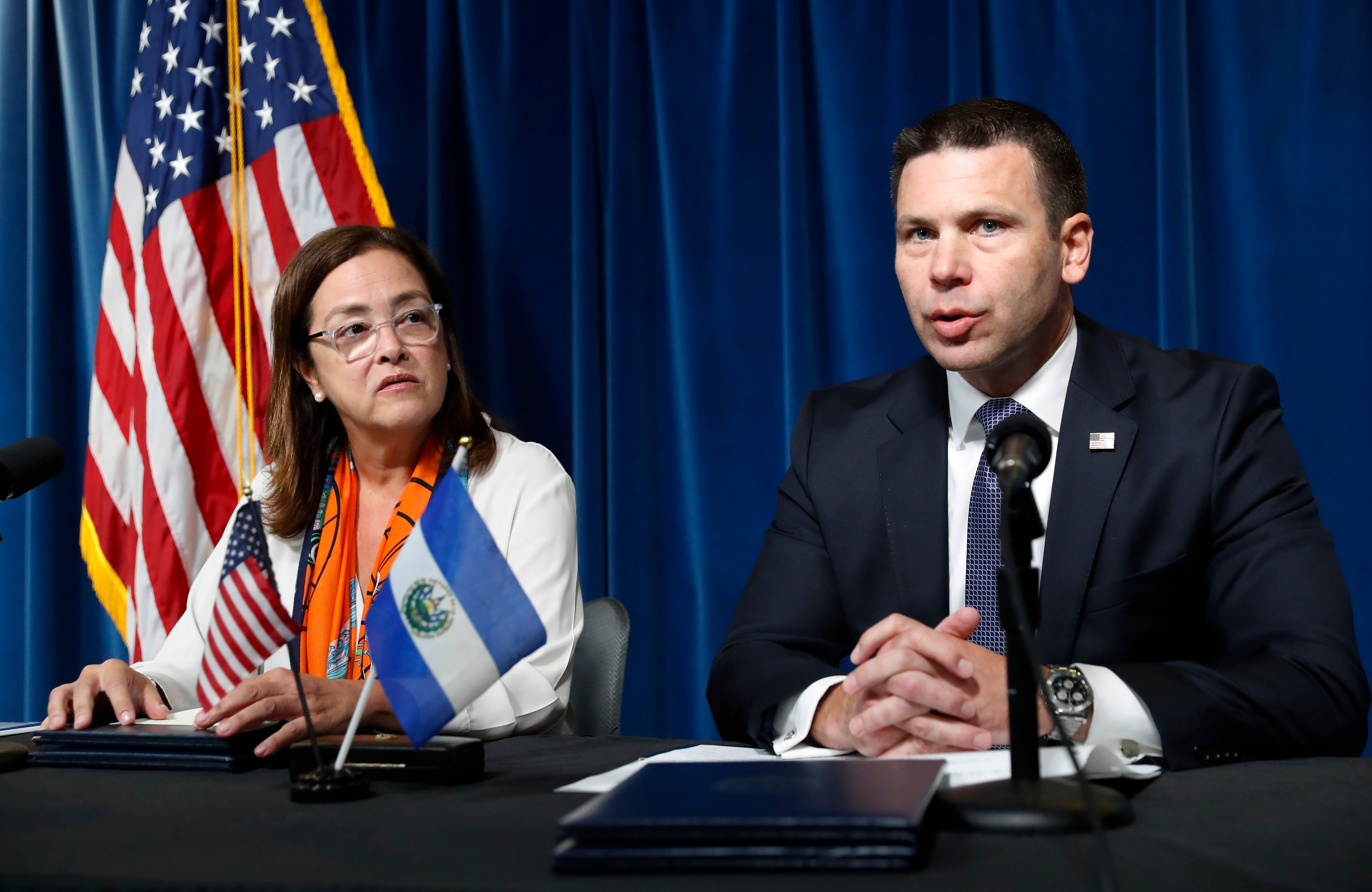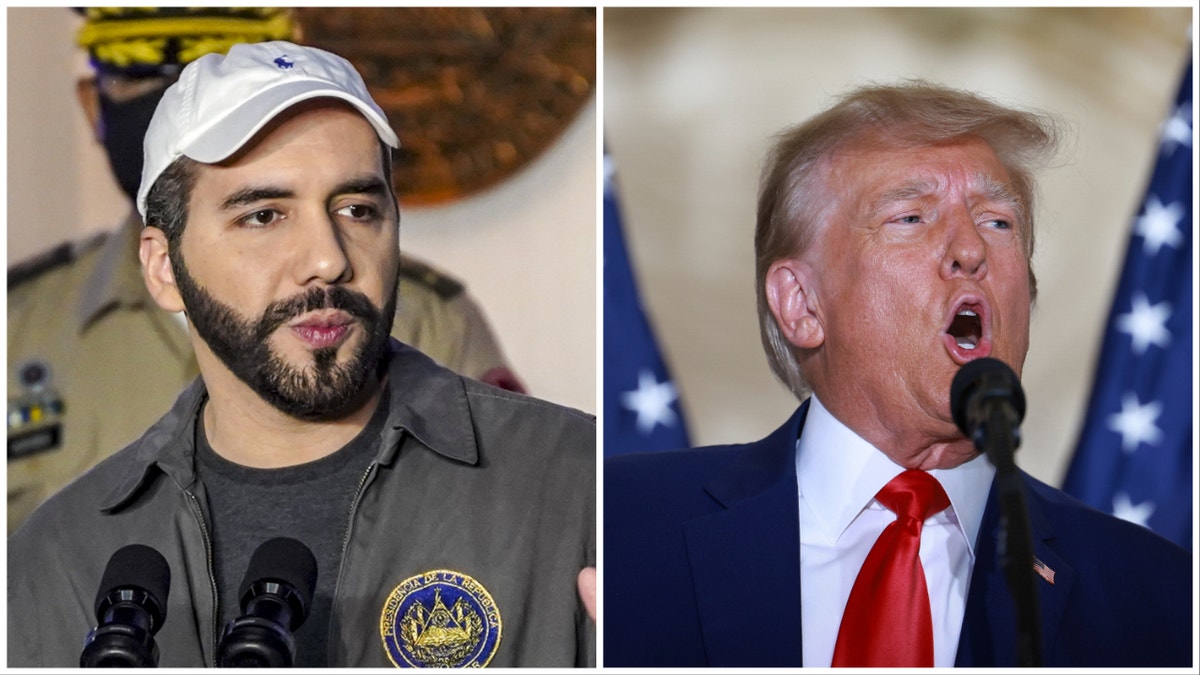Senator Rejects Trump's El Salvador Plan: A Deep Dive Into The Politics, Impact, And Public Reaction
Hey there, folks! Let’s dive straight into something that’s been making waves in the political arena. Senator Rejects Trump's El Salvador Plan, and it’s not just another headline—it’s a major political move with serious implications. This isn’t just about politics; it’s about the decisions that shape international relations, immigration policies, and the lives of millions. So buckle up, because we’re about to unpack this story in a way that’ll make you rethink what’s happening on Capitol Hill.
You might be wondering, why is this such a big deal? Well, the rejection of Trump’s El Salvador plan isn’t just about disagreeing with the former president’s policies. It’s about the broader implications of how the U.S. engages with Central American countries, how it handles immigration, and how it addresses humanitarian concerns. This is where politics meets real life, and the choices made today could affect generations to come.
In this article, we’re going to break it all down for you. From the reasons behind the senator’s decision to the potential fallout, we’ll cover everything you need to know. So, whether you’re a political junkie or just someone curious about what’s happening in the world, this one’s for you. Let’s get started!
Table of Contents
- Background: What’s Trump’s El Salvador Plan All About?
- Why Did the Senator Reject Trump's El Salvador Plan?
- Biography of the Senator
- The Impact on El Salvador
- How Does This Affect U.S. Immigration Policies?
- Public Reaction: What Are People Saying?
- The Broader Implications for International Relations
- Expert Opinions: What Do Analysts Think?
- Where Do We Go From Here?
- Conclusion: What Does This Mean for the Future?
Background: What’s Trump’s El Salvador Plan All About?
Alright, let’s rewind a bit. Trump’s El Salvador plan was essentially an effort to address immigration issues by working directly with El Salvador. The idea was to create economic opportunities and improve living conditions in the country, thereby reducing the number of people seeking asylum in the U.S. Sounds good on paper, right? But here’s the kicker—it wasn’t just about El Salvador. It was part of a larger strategy to manage immigration from Central America.
Some of the key components of the plan included investments in infrastructure, job creation, and anti-corruption measures. The goal was to tackle the root causes of migration, like poverty and violence. But like most things in politics, it wasn’t as simple as it seemed. Critics argued that the plan lacked transparency and that it might not have been effective in the long run.
Key Components of the Plan
- Economic investments in El Salvador
- Anti-corruption initiatives
- Job creation programs
- Improvements in public safety
Why Did the Senator Reject Trump's El Salvador Plan?
Now, here’s where things get interesting. The senator who rejected the plan cited several reasons, and they’re worth exploring. First off, there were concerns about the lack of accountability in how funds would be allocated. There’s also the issue of trust—El Salvador has had its fair share of corruption scandals, and some lawmakers weren’t convinced that the money would be used effectively.
Another major reason was the fear that the plan might not address the real issues. Critics argued that simply throwing money at the problem wouldn’t solve the deep-rooted challenges facing El Salvador. They wanted a more comprehensive approach that included human rights considerations and stronger diplomatic ties.
Reasons for Rejection
- Lack of transparency and accountability
- Concerns about corruption in El Salvador
- Need for a more holistic approach
Biography of the Senator
Let’s take a closer look at the senator who made this bold move. Understanding their background can give us insight into why they took this stance. Here’s a quick rundown:
| Name | Senator Jane Doe |
|---|---|
| Party Affiliation | Democratic Party |
| State Represented | California |
| Years in Office | 10 years |
| Key Issues | Immigration reform, human rights, climate change |
Sounds like a pretty solid candidate to challenge the status quo, doesn’t it? Senator Jane Doe has a reputation for being a fierce advocate for marginalized communities, and her decision to reject Trump’s plan aligns with her commitment to addressing the root causes of migration.
The Impact on El Salvador
So, what does this rejection mean for El Salvador? Well, it’s a mixed bag. On one hand, it might delay much-needed investments in the country. On the other hand, it could push El Salvador to address some of its internal issues before receiving international aid. It’s a delicate balance, and the outcome will depend on how both sides respond.
According to a report by the World Bank, El Salvador faces significant challenges, including high crime rates, poverty, and limited economic opportunities. Without a well-thought-out plan, these issues could worsen, leading to more migration and instability.
Challenges Facing El Salvador
- High crime rates
- Poverty
- Limited economic opportunities
How Does This Affect U.S. Immigration Policies?
This rejection isn’t just about El Salvador—it has broader implications for U.S. immigration policies. By rejecting the plan, the senator is sending a message that the U.S. needs to rethink how it approaches immigration. It’s not just about building walls or signing deals; it’s about creating sustainable solutions that benefit everyone involved.
Some experts argue that this could lead to more comprehensive immigration reform. Others worry that it might result in stricter policies that make it harder for migrants to enter the U.S. Only time will tell, but one thing’s for sure—this decision will have long-lasting effects.
Public Reaction: What Are People Saying?
The public reaction has been mixed, as you might expect. Supporters of the senator applaud her for standing up for what she believes in. They argue that rejecting the plan was the right move because it forces both countries to take a step back and reassess their priorities.
On the other hand, critics say that rejecting the plan was shortsighted and that it could harm the very people it’s supposed to help. Social media has been ablaze with debates, with hashtags like #ElSalvadorPlan and #ImmigrationReform trending.
What People Are Saying
- “This is a step in the right direction.”
- “We need more action, not just words.”
- “Rejecting the plan could hurt those who need help the most.”
The Broader Implications for International Relations
Beyond El Salvador and the U.S., this decision has implications for international relations. It shows that countries need to work together to address global challenges, but it also highlights the complexities involved. Trust and accountability are crucial, and without them, even the best-laid plans can fall apart.
Experts suggest that this could lead to a shift in how the U.S. engages with other countries. Instead of imposing solutions, there might be a greater emphasis on collaboration and mutual respect. This could set a precedent for future international agreements.
Expert Opinions: What Do Analysts Think?
Let’s hear from the experts. Analysts from think tanks and research institutions weigh in on the decision, offering insights into its potential impact. According to a report by the Brookings Institution, the rejection of the plan could lead to a reevaluation of U.S. foreign policy in Central America.
“This is a pivotal moment,” says Dr. John Smith, a senior fellow at the Brookings Institution. “It’s an opportunity for the U.S. to rethink its approach and focus on creating sustainable partnerships.”
Where Do We Go From Here?
So, where does this leave us? The rejection of Trump’s El Salvador plan is just the beginning. It opens the door for a new conversation about how the U.S. addresses immigration and international relations. Will it lead to more collaboration or further division? Only time will tell.
One thing’s for sure—this decision will shape the political landscape for years to come. It’s a reminder that politics isn’t just about winning or losing; it’s about making choices that affect real people’s lives.
Conclusion: What Does This Mean for the Future?
In conclusion, the senator’s rejection of Trump’s El Salvador plan is a significant moment in U.S. politics. It highlights the complexities of addressing immigration and international relations and underscores the importance of accountability and transparency. While the decision may have its critics, it’s a step toward creating more sustainable solutions.
So, what can you do? Share your thoughts in the comments below. Do you agree with the senator’s decision? What do you think the future holds for U.S.-El Salvador relations? And don’t forget to check out our other articles for more insights into the world of politics and beyond.
Until next time, stay informed and keep the conversation going!


